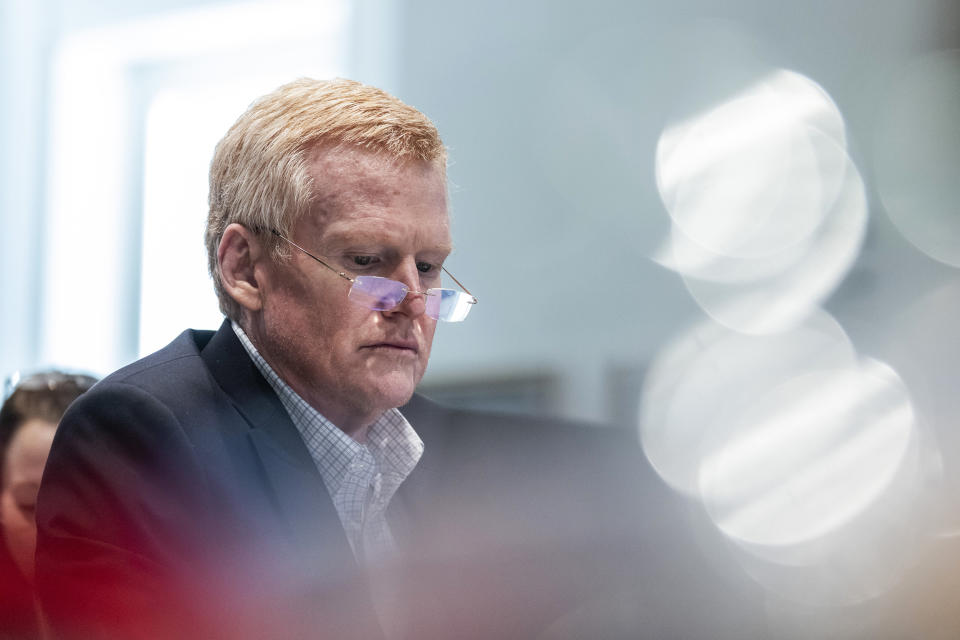Judge allows Alex Murdaugh's alleged financial crimes into evidence at murder trial, a pivotal win for the prosecution
In a pivotal moment in the double murder trial against Alex Murdaugh, a South Carolina judge ruled Monday that he would allow the jury to hear evidence of financial crimes allegedly perpetrated by the once-powerful lawyer.
Circuit Court Judge Clifton Newman made the decision after several witnesses, including Murdaugh's former law firm colleagues and banking associates, testified without the jury present so that he could decide on the relevance of the allegations.
Murdaugh, 54, is accused of fatally shooting his wife, Margaret, 52, and their youngest son, Paul, 22, on the evening of June 7, 2021. State prosecutors contend the murders were committed to cover up a slew of financial misdeeds by Murdaugh, who they say stole about $8.5 million from more than a dozen victims and sought to garner sympathy ahead of being publicly exposed.

"I find that the jury is entitled to consider whether the apparent desperation of Mr. Murdaugh because of his dire financial situation and threat of being exposed for committing the crimes of which he was later charged with resulted in the commission of the alleged crimes," Newman said. "While motive is not a necessary element, the state must prove malice, and evidence of motive may be used to prove it."
Murdaugh's defense team objected to the judge's ruling. His lawyers have previously said in court that his finances are only being used to vilify him and the state hasn't offered any evidence showing Murdaugh would have reaped a financial windfall from the deaths of his wife and son, such as a life insurance payout, nor that they knew of any alleged impropriety, which he sought to conceal by killing them.
"They've got a whole lot more evidence about financial misconduct than they do about evidence of guilt in a murder case. And that's what this is all about," defense lawyer Jim Griffin said Friday.
Newman had said last week that it was the defense who "opened the door" to allowing Murdaugh's financial situation to be up for review when they asked witnesses on the stand about his character and if there was any reason they could think of that Murdaugh would kill his wife and son.
"Evidence of other crimes or bad acts is necessary if it is an essential part of the crimes on trial," Newman said.

The trial, now in its third week, has captured attention as a sprawling saga that began as an unsolved double homicide in 2021, but eventually unraveled into wider allegations of financial fraud, a hired hitman plot and drug addiction, and revived questions into other deaths linked to the Murdaughs, a prominent legal family in South Carolina's Lowcountry.
At the time of his death, Paul Murdaugh had been awaiting trial on three felony counts of boating under the influence for a 2019 boat crash in which a 19-year-old occupant was killed. Prosecutors say the case only drew more scrutiny on the Murdaughs and placed financial strain on Murdaugh as the family faced a wrongful death lawsuit.
Dennis Bolt, a retired attorney in Columbia, South Carolina, who is not affiliated with the case but has served on prior cases with members of Murdaugh's defense team, said the judge's ruling hands the prosecution an obvious advantage "because it allows the state to try to prove that if you are a thief, you are ipso facto a murderer."
But Bolt said he doesn't believe the finance-related evidence shown so far is proof that Murdaugh committed the murders.
Should Murdaugh be found guilty, however, the defense could cite the judge's ruling as grounds for an appeal.
"It's interesting to me to ponder how the prosecution will use it in their closing argument," Bolt said of the financial crime allegations. "They cannot argue anything that is not evidence or law. Since there is no evidence factually linking the financial wrongdoing to the murders, what will they say to the jury?"
Chief prosecutor Creighton Waters said he expects to begin introducing the alleged financial misconduct for the jury to hear starting Tuesday.
Among those who testified Monday was Muschelle Smith, a caregiver for Murdaugh's mother, Elizabeth. Murdaugh has said he visited his ailing mother on the night of the murders as part of his alibi.
Smith testified that it was unusual for Murdaugh to visit his mother late at night, and in the days after the murders, he told her that "if somebody asks you, I've been here 30 to 40 minutes." But she recollected that he had only been there for about 20 minutes.
On cross-examination, Griffin established for the defense that Smith had not seen any evidence of blood when he visited his mother.
Also at the heart of Smith's testimony was a blue tarp that she said she saw Murdaugh carry into the home in the days after the murders.
Earlier in the trial, prosecutors suggested they found a blue raincoat in a closet in the home and it tested positive for gunshot residue.
Griffin unfurled a blue tarp for Smith to make clear what she saw. "A tarp like this, that would maybe cover up a car, is that right?" he asked her. "Any way to confuse this with a rain jacket?"
Smith responded "no," and that the tarp was "balled up."
A state law enforcement agent later testified that the raincoat was tested for blood, but none was found.
This article was originally published on NBCNews.com

 Yahoo Autos
Yahoo Autos 